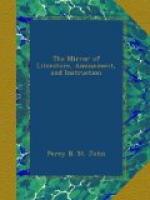These theatres appear to have been cited as nuisances by the parish officers of St. Saviour’s, in which they stood; for in July, 1597-8, a resolution was agreed to by a vestry of the parish, “that a petition shall be made to the bodye of the Councell, (Privy Council,) concerning the play-houses in this parish; wherein all the enormities shall be showed that come thereby to the parish, and that in respect thereof they may be dismissed, and put down from playing: and that four, or two of the Churchwardens, &c. shall present the cause with a collector of the Boroughside, and another of the Bankside.” The presentation of this petition did not produce the desired effect; for some time afterwards the play-houses not having been put down, the Churchwardens of St. Saviour’s, as appears from an entry in their Parish Register, endeavoured to obtain tithes and poor-rates from the owners and managers of the theatres on the Bankside.[5] This corresponds with the state of the English theatre, at this period, at the height of its glory and reputation. Dramatic authors of the first excellence, and eminent actors equally abounded; every year produced a number of new plays; nay, so great was the passion for show or representation, that it was the fashion for the nobility to celebrate their weddings, birthdays, and other occasions of rejoicing, with masques and interludes; the king, queen, and court frequently performing in those represented in the royal palaces, and all the nobility being actors in their old private houses. Alas!
What’s gone and what’s past
help
Should be past grief.
Dryden sung
Support
the stage,
Which so declines that shortly we may
see
Players and plays reduced to second infancy!
—What would he sing in these times!
Among the numerous memoranda of the topography of this interesting district, we find that the well-known iron foundry of Messrs. Bradley, now occupies the site of a Bear-garden. The Falcon public-house adjoining the foundry of that name, was once the most considerable inn in the county of Surrey, the adjoining foundry being anciently a part of it: and it is said that very near the Falcon was once a mill for the grinding of corn, for the Priory of St. Mary Overy.
To conclude. The accompanying Cuts are copied from one of a series of prints illustrative of the antiquities of the metropolis, published by Messrs. Boydell, in the year 1818.
[1] Hist. and Antiq. St. Saviour, Southwark, 1795.
[2] The first we read of Bear-baiting
in England, was in the
reign
of King John, at Ashby-de-la-Zouch, where “thyss
straynge
passtyme was introduced by some Italyans for his
highness’
amusement, wherewith he and his court were highly
delighted.”
[3] Reliq. Wotton, p. 425. Edit. 1685
[4] Winwood’s Memorials, vol. iii. p. 469.




